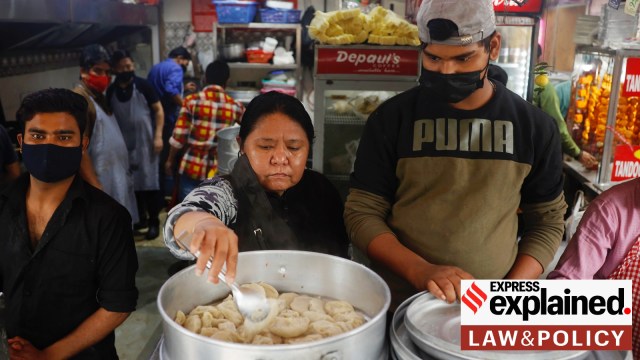Why Delhi’s Dolma Aunty Momos challenged the use of her trade mark, what the law says
The court said in its order that she set up a small momo shop in 1994 and was the “first retailer” of the Tibetan delicacy in Delhi. Who registered a similar trademark to hers and what was the argument against it?
 Dolma Tsering, famously called “Dolma Aunty” by scores of Delhiites, owns the flagship momo shop of the same name in the city’s Lajpat Nagar area. (Express archives)
Dolma Tsering, famously called “Dolma Aunty” by scores of Delhiites, owns the flagship momo shop of the same name in the city’s Lajpat Nagar area. (Express archives)On March 6, the Delhi High Court cancelled a trademark registration titled “Dolma Aunty Momos” in the name of one Mohammed Akram Khan, after Dolma Tsering moved court against him for using her trademark.
Tsering, famously called “Dolma Aunty” by scores of Delhiites, owns the flagship momo shop of the same name in the city’s Lajpat Nagar area. The court said in its order that she set up a small momo shop in 1994 and was the “first retailer” of the Tibetan delicacy, which had since become popular across Delhi-NCR.
Why did Dolma Aunty Momos move court?
Tsering sought the cancellation and removal of Khan’s trademark. She contended that he registered her namesake trademark in 2018, causing her to move the Intellectual Property Appellate Board (IPAB) in 2021.
However, since the IPAB was officially dissolved on April 4, 2021, by the Tribunal Reforms Act, 2021, and its functions were transferred to the high courts, the matter came before the Delhi HC.
Tsering applied for the “Dolma Aunty Momos” trademark in 2022 and it was granted to her on November 17, 2023. Essentially, she claimed that Khan had not only adopted her previously used trademark, flowing from the fact that she first set up her business in 1994, but that he was also using a trademark identical to hers and named after her.
In general, how do trademarks work?
A trademark is a symbol, design, word, or phrase that is identified with a business. Registering a trademark allows its owner to claim “exclusive rights” to its usage.
The Trademarks Act of 1999 governs the regime of trademarks and their registration in India. It guarantees protection for trademarks registered with the Controller General of Patents, Designs, and Trademarks, also known as the trademark registry.
According to Section 25 of the 1999 Act, once registered, a trademark is valid for 10 years and can be renewed by the owner periodically.
Also, using someone’s registered trademark without their authorisation amounts to its violation or infringement, as can using a substantially similar mark for similar goods or services. There is, however, another way in which trademarks can be infringed upon that relates to the Dolma Aunty case.
What is ‘Passing off’?
In Cadila Healthcare Limited vs. Cadila Pharmaceuticals Limited (2001), the Supreme Court said that passing-off is a “species of unfair trade competition or of actionable unfair trading”. One brand, through deception, attempts to pass off its product or service as another, to profit from its existing reputation.
The apex court ruled that the infringing products need not be identical, but the similarity in the nature, character, and performance of the goods of the rival traders has to be established to sustain a claim of “passing off”.
Take a situation where a brand logo is misspelt in a way that it isn’t easy for consumers to discern. For instance, ‘Adidas’ and ‘Adibas’. In such infringement cases, the trademark owner can take legal action and is entitled to remedies such as injunctions (orders to cease an action), damages, and accounts.
In Dolma Tsering vs. Mohd. Akram Khan & Another, Tsering was seeking cancellation of Khan’s trademark under Sections 11(1), 11(2), 11(3)(a), and 47 of the 1999 Act. While Section 11 provides grounds for refusal to register trademarks, Section 47 entails the removal of trademarks from the register and imposing limitations on the grounds of non-use.
When can a trademark’s registration be refused?
Section 11(1) of the 1999 Act states that a trademark cannot be registered because of “its identity with an earlier trade mark and similarity of goods or services covered by the trade mark”, since “there exists a likelihood of confusion on the part of the public…”
Similarly, a trade mark that is similar to another, even for two different goods or services, shall not be registered under a different proprietor’s name. This can be done if the first trade mark is “a well-known trade mark in India” and “use of the later mark without due cause would take unfair advantage of or be detrimental to the distinctive character or repute of the earlier trade mark,” Section 11(2) states.
Additionally, Section 11(3)(a) of the Act says that a trademark shall not be registered if its use in India is liable to be prevented by “any law,” in particular, the law of passing off, which protects an unregistered trade mark.
Besides this, Section 47 allows registered trademarks to be taken off the register once an application is made by an “aggrieved” person to the registrar or the appellate board. The grounds of such an application include “no bona fide use” (that is, not based on genuine intentions) of the trade mark or not registering the trademark with a “bona fide” intention, among others.
What did the court rule?
In its March 6 order, a single-judge bench of Justice Anish Dayal ruled that Khan’s trademark “be cancelled and removed from the Trade Marks Register.”
The court observed that due to the popularity of momos as a type of street food, Tsering had gained a “massive reputation,” adding that she also received several accolades for the quality of goods and services. Owing to the respondent’s non-appearance before the court in this court, the court also said that the allegations of non-use by Tsering went unrebutted and, therefore, would have to be accepted.
- 01
- 02
- 03
- 04
- 05






































